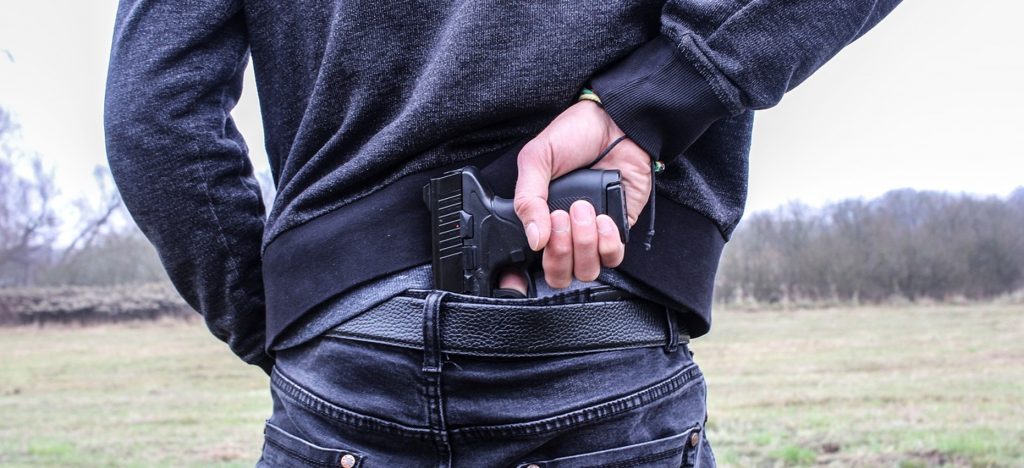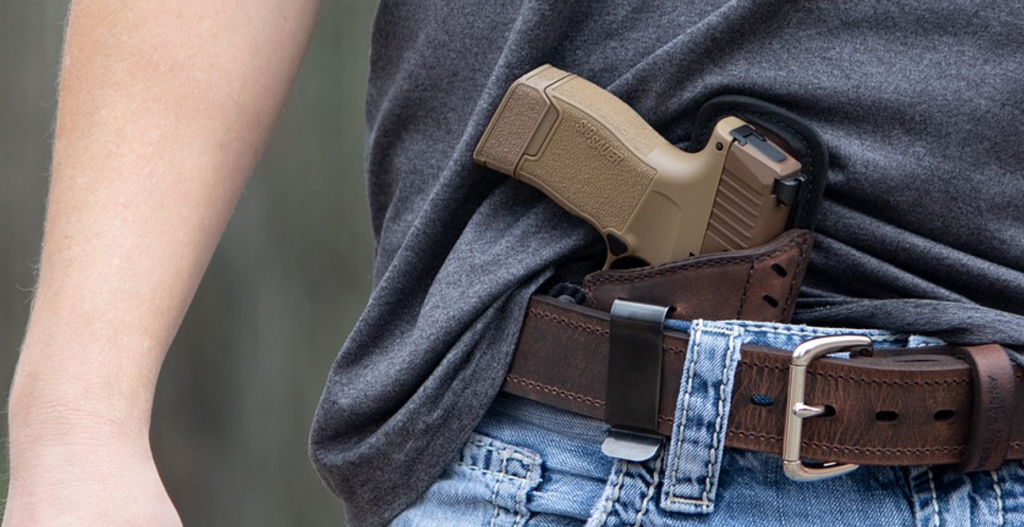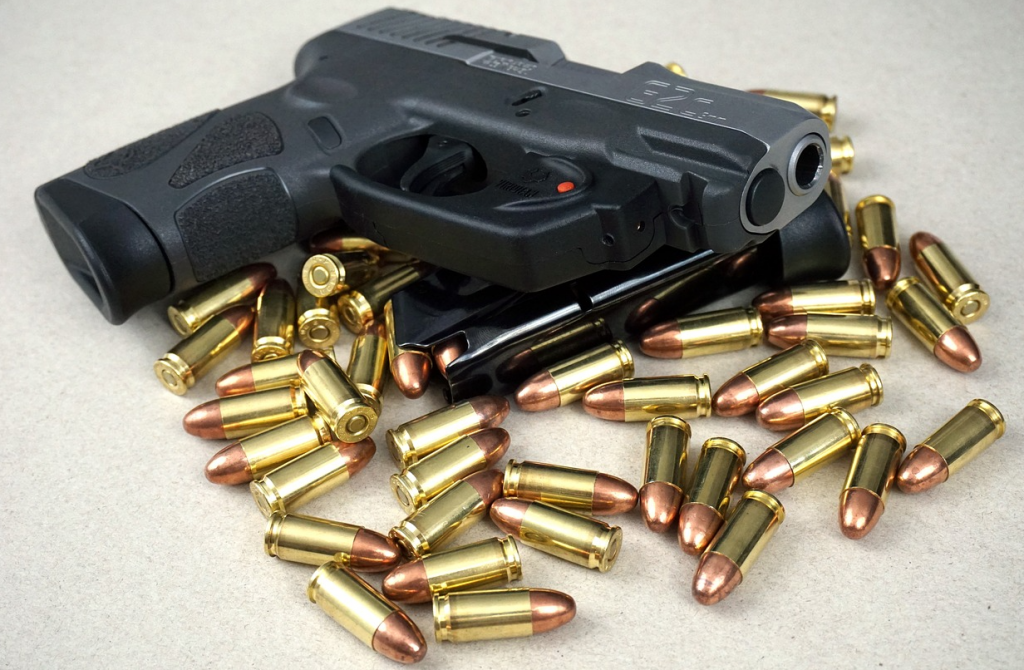Carrying a Concealed Weapon – Premier Defense Attorney
Michigan’s Carrying a Concealed Weapon (CCW) felony criminalizes many different types of weapons and broadly defines “concealed.” If you are accused of CCW, you face possible prison time, years on probation, and hefty fines and costs.

Carrying a Concealed Weapon is a Felony in Michigan
A felony is a crime punishable by a maximum sentence greater than one year in jail. Carrying a Concealed Weapon is punishable by up to 5 years of prison, two years of probation, and considerable fines and costs. Carrying a Concealed Weapon Defense Attorney can negotiate for the reduction or dismissal of charges.
An individual might be guilty of CCW if they carry a concealed knife, a double-edged, non-folding stabbing instrument, or any other dangerous weapon. A weapon in any occupied vehicle is considered “concealed” under this law. There is an exception for a hunting knife adapted and carried as such, whether concealed or in a vehicle.
What is a Weapon?
Some objects, such as guns, swords, or bombs, are dangerous because they are specifically designed to be dangerous. Other objects are designed for peaceful purposes but may qualify as a dangerous weapon. The way an object is carried and the reason it is carried determines whether or not it is a dangerous weapon. If an object is carried for use as a weapon and is likely to cause serious physical injury or death if used as a weapon, it is a dangerous weapon.
A dangerous stabbing weapon is any object carried as a weapon for bodily assault or defense, and that is likely to cause serious physical injury or death when used as a stabbing weapon.
A pistol is not considered a weapon under the CCW statute if it is greater than 26 inches in length. Also, it does not matter if the pistol is unloaded or inoperable if it can readily be made operable. This law does not apply to a short-barreled shotgun or short-barreled rifle lawfully made, manufactured, transferred, or possessed under federal law.

Knowledge and Intent Requirement
A defendant is not guilty of CCW if they did not know a weapon was concealed on their person or in their vehicle. For example, if two people share a coat and one person leaves a knife in a closed pocket, the person without knowledge of the knife is not guilty of CCW. This scenario is more likely to occur in a vehicle shared by more than one person. For example, if a husband and wife share a car and the husband leaves a pistol in the glove box, the wife is not guilty of CCW if she is operating the car without knowledge of the pistol.
What does Concealed mean?
The law does not require complete invisibility. A weapon is concealed if it cannot easily be seen by a person having ordinary contact with the individual in possession of that weapon. A weapon can also be concealed if its appearance is altered so that it is visible, but an ordinary observer would not be able to tell that the object is a weapon. For example, a briefcase designed with a retractable knife would constitute a concealed weapon even if the briefcase was completely visible.
Defenses to Carrying a Concealed Weapon Charges
The most common defense to CCW, like most firearm charges, is a lack of knowledge. If the prosecution cannot prove beyond a reasonable doubt that the defendant knew the weapon was present, they must be found not guilty. If the object is not obviously a weapon, an astute defense lawyer might be able to persuade the court that the object was not carried as a weapon or that it does not qualify as a weapon. Mistake, duress, mistaken identity, and lack of concealment are all viable defenses. Neither Self-defense nor an expired permit are defenses against CCW charges.
A hunting knife is excluded as a concealed weapon. A hunting knife is a large, heavy, wide-bladed knife with a single cutting edge that curves up to a point. The prosecutor has the burden of proving beyond a reasonable doubt that the knife involved was not a hunting knife if this defense is raised.
A defendant who possesses a pistol in a vehicle for a lawful purpose is not guilty of CCW. However, the pistol must be licensed, completely unloaded, and in a closed case or container designed for the storage of firearms, either in the vehicle’s trunk or not easily accessible to any occupant of the vehicle.

Frequently Asked Questions
Clients routinely ask our lawyers questions regarding concealed weapons, pistols, purchasing firearms, and more. Here are some frequently asked questions:
Is it legal to carry a concealed weapon in Michigan?
In Michigan, a person may legally carry a concealed weapon, such as a pistol, if they are in possession of a valid Concealed Weapons Permit (CPL).
What is the penalty for carrying a concealed weapon in Michigan?
The penalty for carrying a concealed weapon in Michigan is up to 5 years in prison and 5 years of probation. There is no mandatory minimum jail sentence.
Can I carry a loaded handgun in Michigan?
A person can carry a loaded handgun in Michigan. If the handgun is concealed, the holder must also possess a lawfully issued, unexpired concealed weapons permit.
Is Michigan an open carry or concealed carry state?
Yes, Michigan is an open-carry state. It is lawful for a person to carry a firearm in public as long as they are carrying the firearm with lawful intent and the firearm is not concealed.
What is the difference between CCW and CPL in Michigan?
CCW, otherwise known as Carrying a Concealed Weapon, is a felony criminal charge punishable by up to 5 years in prison. A CPL, or Concealed Pistol License, is a permit authorizing a person to possess a concealed handgun.
How many years is a gun charge in Michigan?
There are many gun charges in Michigan, ranging from misdemeanors punishable by up to 90 days in jail to felony charges carrying mandatory prison time. A criminal defense lawyer can help you determine your potential sentence if you face weapons charges.
Can you get probation for a gun charge in Michigan?
You can get probation for CCW charges. However, some gun charges, such as Felony Firearm, carry significant, mandatory prison time with no option for probation.
Is possession of a firearm a felony in Michigan?
Depending on the circumstances, illegal possession of a firearm can be a felony in Michigan.
Do you have to tell a cop you have a CPL in Michigan?
Under Michigan law, a CPL holder must immediately disclose to a police officer that they are in possession of a concealed firearm and provide a copy of their CPL and state ID.

Defense Attorney for Carrying a Concealed Weapon
The news is full of stories about individuals who attack groups of people with firearms, knives, and other weapons. These situations frequently garner media attention. Because these cases can be so politically charged, prosecutors and judges can be harsh on defendants accused of CCW. The attorneys with LEWIS & DICKSTEIN, P.L.L.C. will never back down from an aggressive prosecutor or judge. Regardless of the odds or difficulties in a case, we never stop fighting until we’ve achieved the best possible outcome for our clients. Call us for a free consultation today! We will find a way to help you!!
If you are charged with a felony or misdemeanor offense, you will want the best possible lawyer protecting and defending you. (248) 263-6800
Call us today at (248) 263-6800 for a free consultation or complete an online Request for Assistance Form. We will contact you promptly and find a way to help you.









